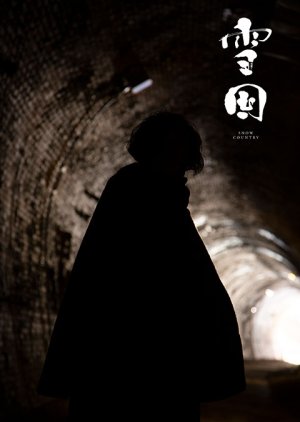
This review may contain spoilers
a haunting adaptation of a Japanese classic.
⚠️ this review contains spoilers, albeit sometimes vaguely worded, in terms of plot and character dynamics. read at your own risk. ⚠️"when a person loves someone too deeply..."
i don't think i can have any coherent thoughts about this special that will be worth anything to anyone more knowledgeable about the source material than i am, but uh. i will attempt to. even if i do i don't think it's ever leaving my brain bc this. God, this.
a bit of backstory—last year i was too focused on completing watchlist deadlines to really enjoy the experience of watching new things itself, and so this year i decided to take a more laid back approach, picking out things to watch at my own pace. i had forgotten about this, placed on my watchlist sometime after the end of September, and found it again when a chance read through the comments revealed that it was officially available for streaming by NHK until October 2023. despite this, i went into Yukiguni practically blind, knowing nothing about it except that it was an adaptation of Kawabata Yasunari's Snow Country (雪国), widely considered to be his finest work (although the author himself disputed that, citing Meijin [名人], or The Master of Go, as his true masterpiece—the latter was one of the only novels that he considered truly finished.) the version of the special that is streamed on NHK World seems to have catered for this, offering a short, two to three minute feature at the beginning and end of each 50 minute segment to serve as context for those who, like me, have allowed it to be their first introduction to the story, or perhaps need a review of its background. (significant time is given during the first segment for a brief biography of the English translator of Snow Country, Edward Seidensticker, whose efforts were highly regarded as a faithful rendering by Kawabata—he later invited him to be present when the author was awarded the Nobel Prize for Literature in 1968, becoming the first Japanese person to win the honor.)
「国境の長いトンネルを抜けると雪国であった。」"the train came out of the long tunnel into the snow country." this is how we begin, but we do not truly catch a clear glimpse of our narrator—Takahashi Issei as the writer Shimamura—until we have returned to a specific point in his memories, through the outside of the car window in which he sits. before then, it is an unfocused lens granting us his silhouette, a view of his back, the cigarettes that he puts out in his office, the project that he is working on. the others in our cast come gradually after that; first Morita Misato as Yoko, the woman across from him, on the other side of the train aisle, then Kora Kengo as Yukio, the passenger she accompanies, terribly ill, who both get off at his stop. but it is Nao as Kamako, standing at the top of the flight of stairs to his room in the inn, that simultaneously catches us off guard and captures our attention. she turns, just barely, to look at him, and we know, now, why he has said that even his finger has remembered the shape of her best. she is not something one can forget.
(it does not hurt that the soundtrack here is being used to her advantage—while i've found that all of the NHK dramas i've watched so far have been well thought out in the musical aspect, Jun Miyake uses his expertise to create a hauntingly sparse atmosphere befitting of the onsen town our story is set in.)
i make this sound captivating, but in truth all of this made almost no sense to me until the last half hour or so. Takahashi, with his way of using the constraints of the character to speak more with his hands and his eyes and his mannerisms than his words (though the latter were not lacking), was in the same boat as i was, acknowledging that Nao, his girl of the snow country, spoke more in riddles than plain words. beautiful to look at, yes, but "wasted effort" in the grand scheme of things when you could not understand them. revealed tragedy, but not the true cause of it. then, somehow, as if by a stroke of luck, everything clicked into place, like finding the last puzzle piece you knew you had been missing but couldn't quite remember where you had left it last. i had to pause and go back and watch from the beginning, savor each interaction, and in doing so i realized that Nao has achieved a rare feat. she is the dark horse of this piece, showing incredible range for such a layered and complicated character. i dare say that while i came for the story of the writer, i stayed for the geisha, and her tale—she has, perhaps, outacted him here, aided by the switch to her narration during that aforementioned half hour. but maybe outacted is not the right word to use. rather, she has come to the forefront, seeming to say that she has been the main focus, instead of our narrator's one-sided view of her.
indeed, the ending IS this half hour, and it is abrupt. there is fire, and falling, and the clever editing of Nao's narration to be bookended by the two, so much so that you forget you have been primed to wait for the sound of a body hitting the snow drifts until it comes, hard and fast, and you follow Takahashi's eyes down to the form below. (i find a parallel, albeit admittedly thin, between this and the ending of Wife of a Spy, the first feature i saw Takahashi in—it seems that he is always somewhere where it is burning, even if, like the former, he is not in frame.) still, shortly after this we are left incomplete, standing at the edge of a cliff, not sure whether we are to be pushed off or placed there permanently. it is tantalizing, expecting something to come next and getting nothing in return. it uneases you as well.
there is an interesting tidbit of information mentioned in the first five minute feature of the second segment that says that perhaps we are not alone in this feeling—a notebook, found in April of 2022, is said to reveal that even up until shortly before his death in 1972 Kawabata was revising the ending for Yukiguni, constantly searching for the perfect solution to the story that he had begun. yet for all of his searching it did not come to pass; the rest of us remain outside, now, at the theater in the snow where he left us, all ablaze, Komako rushing past. Shimamura staggers. he acts fear remarkably well, here, and he is the last thing we see, but she is the one that has her claws in us, urging us, forcing us to look, to understand. "this girl is mad," she says before she leaves, held back at first by the arms of several men, "she's mad." we are not quite sure who, in the end, she is really speaking of.
Was this review helpful to you?










































